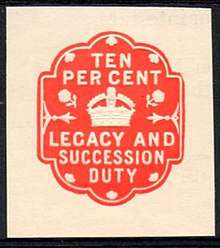Taxation in the Netherlands
| Life in the Netherlands |
|---|
 |
|
Government |
Taxation in the Netherlands is defined by the income tax (Wet op de inkomstenbelasting 2001), the wage withholding tax (Wet op de loonbelasting 1964), the value added tax (Wet op de omzetbelasting 1968) and the corporate tax (Wet op de vennootschapsbelasting 1969).
Income tax
The Netherlands has a partly progressive tax rate. In the past, the highest income bracket in the Netherlands was 72%, but in 1990 it was changed to 60%, and in 2001 it became 52%. The brackets in 2018 are 36.55%, 40.85%, and 51.95%.[1]
Value added tax
For the value added tax there are three categories: foods and essentials, non-foods and luxuries, and special goods. These three categories have rates of 6%, 21%, and 0%, respectively. The non-foods and luxuries percentage was increased from 19% to 21% on October 1, 2012. The foods and essentials percentage is to be increased from 6% to 9% percent, courtesy of the newly formed Third Rutte Cabinet. The special goods cover:
Corporate tax
20.0% for the first € 250,000 and above that a corporate tax rate of 25.0%
Property tax
Property tax or land value tax is claimed annually by municipalities. A fraction of the value of real estate (about a per mille) is defined as onroerendezaakbelasting (OZB). The money collected from the real-estate owners in its area can be used by the municipality to maintain the infrastructure (roads etc.). The real-estate values are estimated independently and updated annually. Taxation varies dramatically over different regions and municipalities. In addition to the property tax itself, there is a complicated additional taxation system for different infrastructural support systems: water-level management, water cleaning, waste management etc.
Gambling tax
No taxes are applied when the sum won is €454 or less, or when the entry fee is higher than the prize won.
If the prize is higher than €449, a tax rate of 30.1% is applicable; however, if the host pays the taxes the sum is multiplied by 100 and then divided by 69.9% and 30,1% of that amount is taken as tax.
Inheritance tax
The inheritance tax (successierecht) charges beneficiaries of an inheritance.
Wealth tax
Possessions like savings, shares, houses that are not the primary living etc. over € 21,139. are assumed to have an annual 4% yield which is taxed at 30%, regardless of the actual annual yield achieved. Consumer goods like cars and furniture, that are not held as an investment, are excluded. An Aston Martin DB5 can, for example, in some cases be taxed, as an ordinary family car will not be.
Gift tax
The gift tax (schenkingsrecht) charges the beneficiary of a gift.
See also
Notes and references
- ↑ 2014 Tax Brackets (dutch) Archived April 19, 2014, at the Wayback Machine.
- ↑ Belastingdienst. "Diensten met 0% btw".
- ↑ "Belasting aangifte - Belastingteruggave.eu". Belastingteruggave.eu (in Dutch). Retrieved 14 December 2016.
